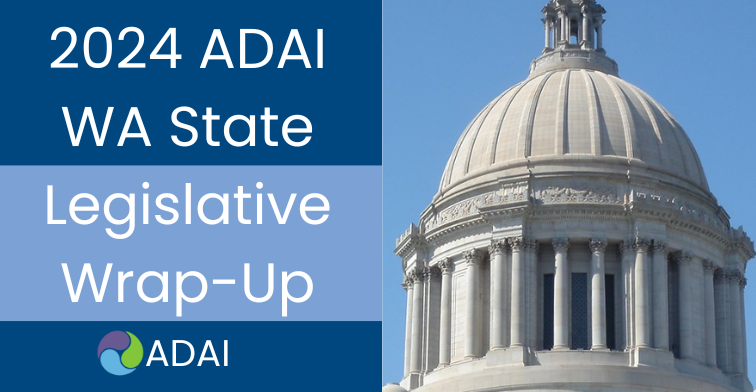2024 ADAI WA State Legislative Wrap-Up
05/29/2024
During the 2024 state legislative session, two bills passed the Washington State Legislature and were signed by the Governor that involved ADAI. Following is a summary of the two bills.
2SHB 2320: An act relating to reducing the public health harms associated with high THC cannabis products
ADAI’s Cannabis Education and Research Program’s (CERP) research about high THC cannabis informed this bill, its rationale, and ideas. With its passage, the bill will result in:
- A targeted public health and social marketing campaigns directed toward individuals most likely to suffer negative impacts of high THC products.
- An optional training that cannabis retail staff may complete to better understand the health and safety impacts of high THC cannabis products.
- A requirement that licensed cannabis retailers post a conspicuous notice at the point of sale in retail outlets including, at a minimum, the following information:
- the potential health risks and adverse health impacts that may be associated with the consumption of high THC cannabis;
- the potentially much higher risks that may be present for younger persons under age 25 as well as for persons who have or are at risk for developing certain mental health conditions or psychotic disorders;
- where to find help in case of negative effects and resources for quitting or reducing cannabis consumption.
For background information about high THC cannabis and policy, here are two resources from CERP:
- Cannabis Concentration and Health Risks
- High THC Policy – Exploring policy solutions to address public health challenges of high THC products
2SSB 6228: Concerning treatment of substance use disorders
The overall purpose of 2SSB 6228 is to increase access to evidence-based alcohol and opioid use disorder treatment in residential and withdrawal management facilities. Through this bill, ADAI’s Center for Community-Engaged Drug Education, Epidemiology, and Research (CEDEER) will receive funding to create a patient shared decision-making tool to assist staff when discussing medication treatment options for patients with alcohol use disorder. CEDEER will distribute the tool to behavioral health providers and instruct them on ways to incorporate the use of the tool into their practices. In addition, CEDEER will conduct regular evaluations of the tool and update the tool as necessary. Parallel activities related to educating staff about the opioid use disorder shared decision-making tool previously created by CEDEER will also be implemented.





